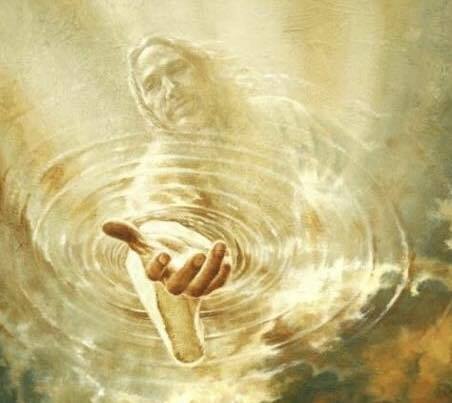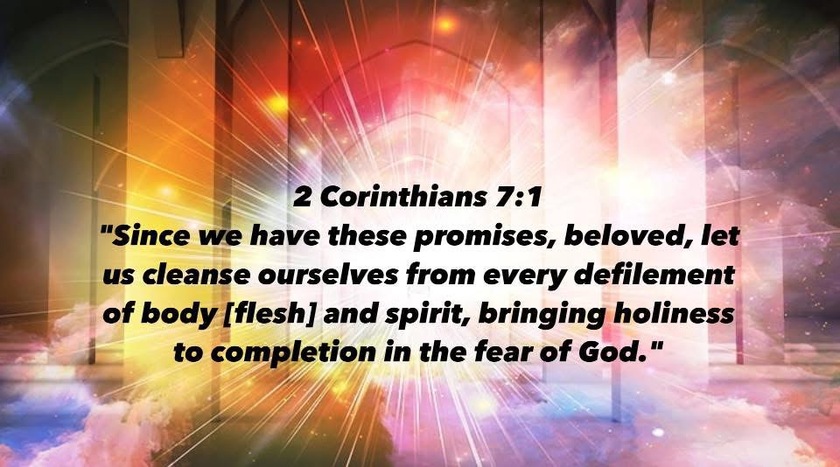Ripples of Grace: How Yeshua’s Living Water Changes Everything
John 3:18
"Whoever believes in him is not condemned, but whoever does not believe is condemned already, because he has not believed in the name of the only Son of God."
Q: What's his name?
A: Yeshua, which is a Hebrew name meaning "salvation" or "God saves," which aligns with his role as the Savior in Christian theology.
Q: What's he saving people from?
A: Faith in Yeshua is the means by which people avoid condemnation for sin, for rejecting the light of the gospel. In Christian teaching, rejecting Yeshua means rejecting God’s offer of salvation, leading to an eternal spiritual separation from God.
Yeshua is the promised deliverer. And what he delivers is the truth of the gospel. He explains God's kingdom and what's coming into the world. But he also explains the world itself.
John 3:19
"And this is the judgment: the light has come into the world, and people loved the darkness rather than the light because their works were evil."
This verse explains why some reject Yeshua, emphasizing the contrast between light (representing truth, righteousness, and God’s presence) and darkness (representing sin, ignorance, and separation from God). This verse highlights a tragic reality: many people prefer "darkness" over the light. This preference stems from their attachment to sinful or "evil" deeds. Yeshua’s presence, as the light, exposes this sin and calls for repentance, which can be uncomfortable or threatening to those unwilling to change. So, judgement isn't arbitrary, it's a consequence of our own human choices.
Jesus (Yeshua) is the revealer of truth, and He brings an invitation into a life in faith. And so, he begins this teaching ministry with his disciples and baptizes them in his name. And only them. Why? I don't know.
So, they are passing through Samaria.
John 4:5
"So he came to a town of Samaria called Sychar, near the field that Jacob had given to his son Joseph."
This sets the stage for the story of the Samaritan woman at the well of Jacob. An encounter with Jesus that is arguably among the most poignant and memorable stories in the gospel. This is a key moment where he reveals himself as the Messiah and extends the offer of "living water" (John 4:10-14).
Yeshua’s journey through Samaria is no accident; it reflects his mission to bring light to all people, not just the Jews, but to the gentile world as well. By passing through Samaria and engaging with a Samaritan woman, Yeshua demonstrates that his message of salvation transcends cultural, social, and religious boundaries. He's aligning himself with his message of friendship with God for any people who have faith in his name. The location near Jacob’s field (John 4:5) also connects Yeshua’s ministry to Israel’s history. Yeshua’s presence there signals that he is the fulfillment of that covenant, offering "living water" that surpasses the physical water of the well (John 4:10-14).
And here it is that Jesus first publicly comes out as the Messiah. And he comes out to a very unexpected audience. The Samaritan woman was an unlikely recipient of Yeshua’s attention first due to her gender, then her ethnicity, and finally her very questionable moral status. But if you pause the cultural context for a moment you'll see the larger picture here. This encounter ultimately shows that Yeshua, is the revealer of truth, and seeks out those in spiritual darkness; those who, like the Samaritans, were often rejected by the religious establishment. And this is made even more plain in her words as she and Jesus wrestle with theological differences.
The Samaritan woman, living in a context of spiritual, and social "darkness" (due to her sin and Samaritan identity), encounters Yeshua’s message of light. And his conversation with her exposes her past (John 4:17-18) but also offers grace, inviting her into faith in him and his living water. The Samaritan woman faces a choice: to accept Yeshua’s revelation or reject it. And as a consequence, the Samaritan woman’s testimony leads many in her town to believe in Yeshua (John 4:39-42). So, we see the redemptive power of Jesus' name and the evangelical work that comes from his message. Yeshua’s choice to pass through Samaria shows his intentional outreach to all humanity, fulfilling his role as the light of the world (John 8:12).
Q: What is this living water?
A: The concept of "living water" in the story of the Samaritan woman at the well (John 4:5-42) is a central metaphor that carries deep theological and spiritual significance. Yeshua presents himself as the giver of living water, implying his divine authority and identity as the Messiah (John 4:26). This echoes the Old Testament imagery of God as the fountain of living waters (Jeremiah 2:13). Jesus is subtly claiming His divinity. And revealing himself in this light publicly now.
Later in John’s Gospel, living water is explicitly linked to the Holy Spirit. In John 7:37-39, Jesus says, "If anyone thirsts, let him come to me and drink…Out of his heart will flow rivers of living water," which the text clarifies and refers to as the Holy Spirit. This living water in John 4 therefore is foreshadowing the indwelling Spirit that believers receive.
John 4:13-14
"Jesus said to her, ‘Everyone who drinks of this water will be thirsty again, but whoever drinks of the water that I will give him will never be thirsty again. The water that I will give him will become in him a spring of water welling up to eternal life.’"
The concept of "living water" in John 4:10-14, as offered by Yeshua to the Samaritan woman, carries profound theological significance, particularly when contrasted with the religious communities of the time; namely, the Jewish and Samaritan religious establishments. The physical water of Jacob’s well represents temporary salvation, earthly provision, the law of God and the earthly temple. While the living water represents eternal life, and spiritual provision in Christ through the works of the Holy Spirit. This contrast highlights Yeshua’s superiority to Jacob (John 4:12) and the old covenant, fulfilling the Samaritan woman’s spiritual longing.
The Jewish religious tradition emphasized conformity to the Law and the Temple practices, often prioritizing external obedience over internal renewal. Likewise the Samaritan religious traditions focused on adherence to their Torah and Mount Gerizim worship, with less emphasis on personal transformation and more on maintaining their distinct identity. And we see this even today in the religious communities that have developed traditions that focus the faith on the temporal priestly orders and many rituals. And what we see, is that these systems foster legalism and exclusion, often marginalizing individuals like the Samaritan woman, who don't fit their moral or social standards.
In contrast the living water prioritizes personal renewal over institutional conformity. The woman’s transformation shows that Yeshua’s salvation is individual and relational, not dependent on one's religious status or adherence to their many rules and stumbling blocks. This resonates with John 3:18-19, where belief in Yeshua (the light) brings salvation, while clinging to "darkness" (e.g., rigid traditions or sin) leads to condemnation.
The religious communities’ focus on location and ritual reflects a form of darkness. And that darkness obscures the light of salvation. The religious communities’ reliance on ritual and exclusivity contrasts with the simplicity of receiving living water through belief. It complicates grace, binding it up in tradition and superstition.
This fixation on specific locations and doctrines limits God’s presence to a physical space, or ideological dimension, thereby obscuring the truth that God is spirit and accessible everywhere (John 4:24). This focus fosters division and pride, blinding them to Yeshua’s universal mission as the light (John 3:19).
The simplicity of Yeshua's living water counters the complexity of these religious systems. Yeshua’s grace is free and accessible, requiring only faith. His living water embodies the straightforward salvation he offers, unencumbered by the human constructs of religion.
Prayer: Yeshua, thank you for the living water that washes away the darkness of tradition. Help me receive your grace with simple faith. Thank you for offering living water that saves and simplifies my faith.




















